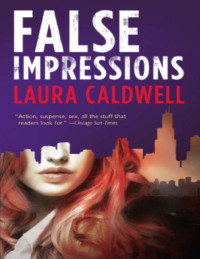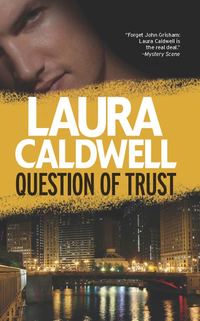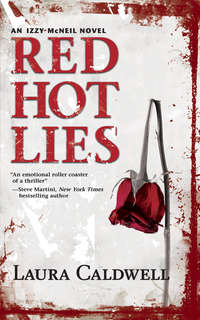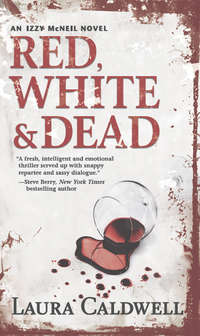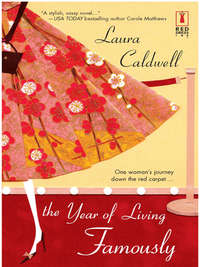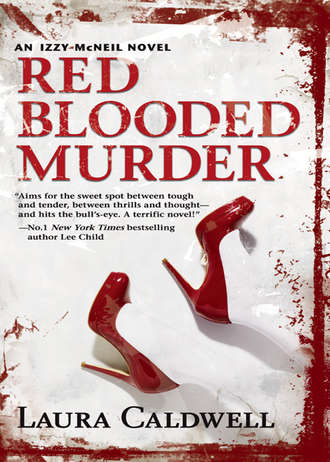
Полная версия
Red Blooded Murder
“Does Lexi have red hair?”
“Yes.”
“Lexi,” I said, trying the name out. “Lexi what?”
“Lexi Hammond.”
“Lexi Hammond,” I repeated. “I like it. But wait a minute, what about filling out IRS forms and stuff? Won’t I need a social security number?”
“They’re paying you cash under the table. And then I’m paying you a freelance investigator fee.”
“Shouldn’t I be getting an investigator license if I’m going to keep doing this?”
“Nah. It’s a pain in the ass to get a license in Illinois. And expensive. Plus, I just need your help to get intel. I don’t want you to testify or anything like that.”
I thought of something else. I told Mayburn about my job at Trial TV. “But Jane says I won’t be going on-air right away.”
“Should be fine. I need you to start tomorrow, Sunday, and if we’re lucky I won’t need you more than a few weeks. So, what do you think, Lexi?”
“Does Lexi get a discount?”
“I knew you were going to ask that. Thirty percent.”
I clapped my hands and pushed the omelet away. “Let’s go.”
10
Zac Ellis opened their weekend house in Long Beach, Indiana, the way he always did. He walked through the place, turning on lights, dialing the thermostat up or down, opening windows just to get some fresh air in the place. Often, he would be followed by Jane when she was done with a broadcast, and the fresh air would twist its way though the house and into their lungs and even into their relationship, and they almost always felt much better within hours of arriving.
But he could tell today would be different. The fresh air, colder today on this side of Lake Michigan, seemed too harsh. And so was the news of Jane’s latest bit of messing around. How had he ever thought he could handle it?
He stopped for a moment in their kitchen. It was narrow and crammed with old, kitschy appliances they’d picked up at antique malls and flea markets—so different from their vast, metropolitan kitchen in Chicago. Standing there, he thought about his history with Jane. Before they’d met, he dated deep, brooding women. Artists like his ex Zoey, who were dark and moody, who wore funky clothes and who painted in a studio for days at a time.
Jane was so different from those women—tall and flashy and up-front about everything. He hadn’t been mesmerized with the whole TV world, or even really that interested. Which had given him the mistaken impression that he would never fall for Jane. How very, very, very wrong he had been.
He left the kitchen and walked down the narrow hallway toward their bedroom. The house was built in 1927, and so, like the kitchen, the room was small, and their antique brass bed had to be pushed into the far corner. He leaned against the wall, shoving his hands into the pockets of his jeans, imagining Jane there. Almost ten years ago, about a year and a half after they’d met, they got married on the beach two blocks from here, and they spent their first night as a married couple in that bed.
It felt good to picture Jane this way, with him. Lately, his mind only held pictures of her with other men.
Yes, Jane was the love of his life. He never doubted that—still didn’t—but he was starting to wonder if his love, his passion, his intensity for her could survive these affairs. She’d said she would stop, but she hadn’t. And after coming home from New York and discovering her gone again, he saw that fidelity was a lofty goal in Jane’s eyes, one she was never going to be able to achieve on a regular basis.
He walked over to the bed and scratched at the brass with his thumbnail. It was starting to blacken, losing its luster. He would have to polish it. He was always the one who had to do these tasks around the beach house—cleaning up the yard, splitting the wood, retouching the crumbling paint. Jane disliked such chores, and it pleased him to take care of them for her, for them.
He kept scratching at the brass. The chalky black wouldn’t seem to budge. He wondered if it could be removed at all, or whether it had spread too far. He wondered the same thing about Jane’s affairs.
The thing was they weren’t even affairs. They were one-night stands mostly. She loved only him, she said, wanted to be married only to him. But damn it, what did it say about them that she needed such experiences, that she couldn’t give them up?
Suddenly, taken by a rage that exploded in his belly and shot into his hands, he grabbed the rail of the headboard and rattled it violently, as if he might shake away the tarnish. The headboard banged against the wall, which only made him think of Jane, rattling someone else’s headboard. He shook it harder, the pounding increasing, the bam, bam, bam getting louder and louder. He liked the violence of it, the feeling that energy trapped inside him was coming out, and so he kept shaking the bed, kept hammering it against the wall, until it sounded like the staccato of gunfire.
And then he pictured himself, acting like a teenager, unable to control his emotions.
He stopped. He calmed down. “Enough,” he muttered out loud, to no one, his voice forlorn in the empty house.
He turned and kept walking through the rooms, inching open a few windows, wiping the dust from the end tables in the living room, embarrassed at his solitary display of rage.
Zac liked to consider himself a strong person. Jealousy had rarely been a problem before this. When Jane told him about the first guy, a year after they were married, she was so nervous, he almost thought it funny. He had never been possessive, and he had never thought he could possess someone like Jane. And so he told her to be careful and to not make it too much of a habit, but that he understood. Of course, he added, if she was going to do that, then he could sleep with the occasional woman if he wanted. But the thing was he never wanted to. Jane was enough for him. He had ventured outside their marriage only once, with Zoey, mostly because he felt it would somehow even the score, but all he could think about was Jane.
And now he was tired of being her fool. Check that. Judging from his tantrum with the bed, he wasn’t just tired, he was pissed off. Truth was, he was starting to despise her a little bit. And he hated that. How could he love her so much and hate her at the same time? It was a sadistic circle.
Strangely he had seen the same pattern play out in his parents’ relationship. His mother, Martina Ellis, was an artist, a flamboyant woman who hit her stride in the seventies when she changed her fine arts perspective to one of “super realism.” His dad, after their marriage, followed her to different places around the world—sometimes Manhattan, sometimes the South of France or London—so she could paint. His father often sat in the background, supporting his wife. When Zac was born, it was no different. He loved his mother, but she intimidated him with her talent and her unapologetic exuberance. That was true even to this day. It was his father he was close to. And so when his dad finally grew weary of taking the backseat, Zac understood perfectly why he had to divorce his mother.
His dad understood Zac well, too. He understood why Zac would be attracted to someone like Jane, and he had been very empathetic lately when Zac called him, asking vague questions about marriage and how his dad handled it. His father answered all such questions with his usual blend of patience and candor. He spoke to Zac of how he “managed” Martina when she needed it, how he propped her up when the critics were ruthless, how he held her arm proudly when they walked through a glittering gallery showcasing her work.
But in a recent conversation, his father paused and spoke a few words that haunted Zac.
“Remember one thing,” he said. “It was a battle, and I didn’t win it. I had to leave.”
Those words blazed through Zac’s mind now as he walked through their house one more time, then outside and onto the deck. In the summer, the deck would hold chairs with big padded cushions, a chaise, a hammock, two umbrellas. But now only an iron patio table stood alone, stark and lonely in a cool patch of light.
Usually, he would be relaxing now that the house was open, maybe starting to think about a bottle of wine to uncork for Jane. But Jane would not be coming today. He’d told her to stay the hell away from the beach house, from him. Without her, the house seemed only half-full of its usual vitality, but he couldn’t stand the sight of her right now. Her bullshit dalliances were causing his mind to swirl, to wonder—Was it him? Or was it them? And how could he get his mind around it? Because he didn’t want to lose the love of his life.
And then there was another persistent question—why should he be the one who had to ask these questions, to ponder new versions of right and wrong?—Why was it Jane who got to do whatever she wanted while he had to wade through the muck left behind?
He stormed from the deck back into the house. He would focus on something else, on some work around here. That was what always calmed him.
He hurried down the old, slanted staircase into their basement. On the workbench that was original to the house, amid the house paint and the tools, he found the brass cleaner he had used on the bed when they bought it. He grabbed a few rags from the bin under the bench and took the stairs back up two at a time.
In the bedroom, he chose a spot on Jane’s side and furiously scrubbed at it with the polisher. The black started to lift, but the brass remained dull. He grabbed a clean rag and ran it back and forth, hard, over the spot. Still, it wouldn’t shine. The brass appeared slightly greenish, as if it had been inhabited by a mold that had simply taken over the bed.
He squirted more tarnish remover on the rag, scrubbed again and again and again. He tried a clean rag. The tarnish couldn’t be removed.
“Goddamn it,” he said. “Goddamn it.”
His voice, low as it was, cut through the crisp, spring coolness of the house, and he heard the anguish there. For some reason, it was that sound, that tone, which overwhelmed him.
He sank to his knees and grief washed over him. He couldn’t go on like this. They couldn’t go on like this. He began to sob. He hadn’t cried in eight years, not since his grandmother, his dad’s mom, passed away.
But the tears were different now. They weren’t the soothing sobs to mourn the passing of a life lived well. These were angry sobs, full of despair. And mostly, full of fear.
Because he had no idea how he would handle this grief. He had no idea how to move on from here.
11
“Have you ever cheated?”
Sam shot a sideways glance at me. His green eyes sparkled like olives in a martini. “Not on you.”
“On anyone?”
His eyes moved away, looking toward the empty stage. As he did so, the overhead lights glinted in his cropped blond hair, making him look like the California boy he was.
We were no longer engaged or exclusive, but now, as we tried to figure out what to do with our lives and ourselves, Sam and I dated. Which meant that instead of spending our nights making dinner at home or watching the Cubs on TV, we went out for nights like this.
We were at Wise Fools, a bar on Lincoln Avenue, where we often went when we first met. Like a lot of the other bars on Lincoln, it was wood-clad and beer-soaked, the kind of place that brought out the twenty-somethings searching for Bud Light specials. But Wise Fools booked great bands, too, and since Sam was a guitar player and an all-around music lover, we’d been finding ourselves there every few weeks.
The band tonight was Mutha Goose, which I thought was just about the stupidest name I’d ever heard, but Sam’s friend R.T. was the lead guitarist. R.T. and Sam often played together, but Sam never had the time to be in a real band. He was always too busy with business school and then work. Sam, who had been Forester Pickett’s financial advisor at a wealth management firm, had lost his job, too, after taking off temporarily with Forester’s property, but unlike me, he’d landed on his feet. The fact that the whole mess had been in the news hadn’t helped me one bit. Lawyers don’t like even a whiff of a scandal associated with their law firm. The same was true with Sam’s business. None of the wealth management firms would take him on, but a friend gave him a job on the trading side of the business. He didn’t seem entirely happy, but I couldn’t tell if that was because of the new job or because we had broken up. Or maybe because he didn’t have the time to play much music lately, something which made him a little irritable.
R.T. came on stage. By day, R.T. sold computer software, but his passion was his music, and nights like tonight, he looked like a musician—jeans that appeared not to have been washed for weeks, leather flip-flops, brown bangs that fell in his eyes instead of being gelled into submission.
Sam waved hi to his friend, then turned back to me. I could see some kind of struggle in his eyes, but whether it was because he wished he were on that stage or he wished he didn’t have to answer my question, I didn’t know. I used to be able to read him so well.
“I’ve cheated.” He said it simply, almost resignedly, as if it were something he’d wrestled and come to terms with.
I felt a well of disappointment. Sam was a cheater. At that moment, I wanted to look at anything but him. I picked up my BlackBerry from the table and scrolled through the texts and e-mails. There was a time when my in-boxes would have been choked with cries for help, when someone always needed me or my opinion. Now they were fairly empty, save a text from my brother, Charlie, saying he might stop by the bar to say hello.
I could feel Sam watching me, gauging my reaction to his statement.
I put the phone back on the table and thought of his ex-girlfriend Alyssa, a woman who was beautiful and reed-thin. She and Sam had dated at the end of high school and into college. She was an angelic blonde who worked in geriatric research, making the world better for the elderly. In short, she made me feel like a shallow devil—the brassy, redheaded entertainment lawyer.
I didn’t necessarily like Alyssa, but I felt pain for her now because she must have been the one Sam was talking about.
Finally, I looked at him. “You cheated on Alyssa?”
Sam shook his head. “Carrie.”
“Carrie, your first girlfriend ever?”
“Yeah.” He lifted his Blue Moon beer from the table and poked at the orange slice with his finger.
“Sam, you were like a freshman in high school.”
I thought of the monumentally idiotic things I’d done during high school. Once, when my mother was out of town and trusted me enough to babysit my brother, Charlie, I forced him to be the bartender for the monster bash I threw. He was twelve at the time. Charlie ended up drinking beer as he poured it from the keg and later threw up violently over our balcony and into the alley behind our apartment, one of the most scary and heartbreaking things I’d ever witnessed. Doing stupid things made you smarter, I figured. I’d certainly never treated my brother like that again. If anything, I had cherished and babied him after that. Oddly, he remembered the incident fondly.
“Does that really count?” I asked Sam.
“Hell, yeah. She was my first love.” He grimaced, as if what he’d done still tortured him. And that made my heart fill with love, like a balloon given a shot of air from an inflator.
“You were so young,” I pointed out. “You didn’t know what you were doing.”
“Yeah, I did.” He looked straight into my eyes. “You want to know why I did it?”
I nodded, almost afraid to say anything. This was one of the things I liked about our breakup—despite the drama and the uncertainty, we were completely honest with each other now. Sure, we were honest before all this, too, but now it was different. Now, it was microscopic, as if we were both laying all our cards on the table and saying, If we’re going to do this, here’s the truth. The real, deep-down, not-so-tidy, sometimes-it-will-make-you-flinch truth.
“You know what my dad is like?” Sam asked.
“A drunken, selfish bastard.” I had never met Sam’s dad. Neither he nor his sisters had any consistent contact with him, but I’d heard the stories.
R.T. and his band began playing. Their first number was a cover of a song by The Killers called, appropriately enough, “All These Things That I’ve Done.” The lights in the bar dimmed. The stage lights, orange and bold, grew stronger, while the music grew louder until it seemed the stage pulsed like a heart.
Sam pulled his chair closer so I could hear him. “This was a few years before my mom finally got rid of him,” he said. “Then I kind of wanted to be like him. I thought the way he acted—tough and swaggering and hard-partying—was how guys were supposed to be. So I acted like that, you know? My mom was mortified, and she tried to stop me, but I didn’t care. I just …” His words died away for a second.
“You wanted him to love you.” I watched his face for a reaction, hoping he wouldn’t close down the conversation because it was too uncomfortable, something that might have happened before our breakup.
Sam blinked slowly a few times, his brown lashes hitting his cheeks, already tan from playing rugby outside. “Yeah. Exactly. I could tell he wasn’t going to be around for long, and even though I knew he was a jerk, I was terrified of having to take care of my sisters and my mom, even though no one ever said I had to. So I drank a lot and smoked pot and just kind of pretended I was like him. And then one day … man, I can remember it exactly … I came home from school early because I wasn’t feeling good or something. And he had this girl in the house. I knew her. She was a waitress at one of the pancake houses he owned, and she was the one I’d always had a crush on.” Sam shook his head. “They didn’t hear me come in. She was on the counter and they were …”
“Going at it,” I finished for him, feeling the bewilderment and shock Sam must have experienced.
“Yeah.” He laughed, a brittle sound. “Like, right there on my mom’s countertop. I just turned around and left. I went down the street to this park and I sat there for four hours. The next night, I went to a party and picked a fight with Carrie, and as soon as she left, I walked up to this girl by the pool. We ended up making out behind the pool house for an hour.”
“And you think that’s cheating?”
“Yes,” he said without hesitation. “Don’t you?”
“Yes,” I said, relieved to be on the same page with Sam about this, about anything.
Sam moved his chair even closer. He put his arm around my back and nuzzled my neck.
“Red Hot.” Sam whispered my nickname in my ear. “I miss you.”
I turned my head to nestle into him. But then I remembered Theo. Guilt ripped through me. I hadn’t cheated, I reminded myself. I hadn’t, I hadn’t.
But I felt as if I had. Sam kissed me, and the room seemed to disappear. In the distance, I heard the band play a slow, hard version of “Tempted” by Squeeze. Tempted by the fruit of another … Alarmed by the seduction … I wish that it would stop.
Except that I had no interest in stopping Sam now, or whatever would happen with us later that night. Suddenly, I didn’t care about the technicalities of dating two men, of whether that made me a bad girl, a temptress or a slut, when before I’d always been the pillar of fidelity, the poster child of monogamy.
“Hey, what am I interrupting?”
Sam and I pulled apart. I blinked at the figure that stood in front of our table, backlit by the stage lights. It took me a moment to make out my brother, Charlie, who wore a bemused expression on his face.
“Hey, man!” Sam jumped up to give Charlie a hug. The two of them loved each other.
Charlie returned the hug, thumping Sam on the back. Charlie had chestnut-brown hair but in the stage lights, you could see a tinge of red. He had spiral curls like mine, which he let grow a little longer than most men’s hair. He was one of the sweetest guys I knew. Also one of the laziest. Charlie had been living off a worker’s comp settlement for a few years now, and all his friends called him “Sheets” because he spent so much time in bed.
I stood, and Charlie made his way around the table. He hugged me tight, lifting me off the floor. “How are you doing, sister?” He set me down, and we smiled at each other, saying nothing. “Good,” he said, reading in my eyes that I was just fine. At least at that moment.
Sam found another chair for Charlie, and as he sat, my phone lit up. A new text message. I picked it up. Somehow I’d gotten three texts in the time Sam and I were kissing. All of them from Jane Augustine.
Are you doing anything tonight? the first said. Would you be able to come over to my house?
Hi, Izzy, the next said, I’m so sorry to bother you but not sure who to call. I’m kind of freaking out here, and I wondered if you were out and could stop by.
Izzy, the last said. I need some help.
I looked at the call log and saw she’d called twice but hadn’t left a message.
I went into the front room of the bar, where it was quieter, and called Jane.
“Thank God,” she said, answering. “I’m so sorry to interrupt your night, but can you come over?”
“What’s going on?”
“Someone has been in my house.”
“What? Is Zac there?”
“No, he took off today for our weekend place.” She exhaled hard. “I came home, and I found some … well, some stuff in my house.” She was talking fast, her voice distressed. “Someone has been in here.”
“Have you called the cops?”
“No!” Her voice was alarmed now, anxious. She sounded as if she were bordering on tears. “Izzy, you know how it is. If I call the cops, then this is all over the news. The network is launching Monday. A legal network. This is not the kind of PR we need.”
“But are you safe?”
“I’ve been through the whole house. There’s no one here now.” She sighed. “I didn’t know who to call, and you were always the one we went to when there was any problem with work. I don’t know … Is there any way you could come over?”
“What’s your address?” I asked.
She told me.
“I’ll be right there.”
12
Jane’s place in River North was one of eight town houses, all clearly built at the same time, probably by the same developer, but hers was the nicest—an elegant graystone, nearly white. It was new construction but built to appear old with iron streetlamps with electrical flame that flickered like real fire and a black iron fence with twisted posts. French balconies surrounded the tall upstairs windows.
The house was lit up—all the lights must have been on—but the shades on the first floor, tasseled at the edges, were drawn, hiding whatever was happening there. I hurried up the front steps, trailed by Sam and Charlie.
The brass knocker was shaped like a lion’s head. I used it to pound on the door.
Jane answered right away, as if she’d been standing behind the door, waiting for us.
She wore workout clothes—black pants that hugged her long legs and a tight pink T-shirt that proclaimed the name of a local jewelry store and said, Simply the Best for 20 Years. Her hair was in a high, swinging ponytail. She seemed younger somehow, almost like a girl barely into her teens who looks like an adult from far away but seems so vulnerable and coltish up close.
Or maybe it was the scared look on Jane’s face.
“Izzy!” She launched herself into my arms with a fierce, tight hug. We’d never really embraced before, but I could tell she needed it, and I squeezed her back just as tight. “Thanks so much for coming.” She drew back. “You look cute,” she said, distractedly.
“Thanks.” I was wearing a red, patterned skirt and tall black heels for my date with Sam. “Jane, this is Sam, my …” I still didn’t know what to call him. My ex-fiancé wasn’t right, and boyfriend wasn’t, either. I decided to just skip it. “And my brother, Charlie.”




